|
|
|
Sort Order |
|
|
|
Items / Page
|
|
|
|
|
|
|
| Srl | Item |
| 1 |
ID:
059155
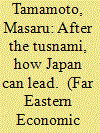

|
|
|
|
|
| Publication |
Jan-Feb 2005.
|
|
|
|
|
|
|
|
|
|
|
|
|
|
|
|
| 2 |
ID:
110279


|
|
|
|
|
| Publication |
2012.
|
| Summary/Abstract |
This article tries to examine the role played by the Army during a natural disaster. India's federal set-up tends to complicates issues and, quite often, politics dominates the humanitarian aspect, which leads to delays in the development of the army. This article is a case study of the Kosi flood of 2008 in Bihar, which was an outstanding example of civil-military cooperation. The article also analyses the successful efforts made by retired Army personnel for curbing the Naxal problems in the state. But the article also poses certain questions: Is the deployment of the army in humanitarian crises good for it? Will political controversies damage the credibility and effectiveness of the Army?
|
|
|
|
|
|
|
|
|
|
|
|
|
|
|
|
| 3 |
ID:
106786
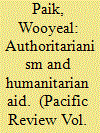

|
|
|
|
|
| Publication |
2011.
|
| Summary/Abstract |
Severe natural disasters encourage the international community to donate humanitarian aid (materials and personnel) to the affected country, which is critical for its human security. Some authoritarian regimes, however, rationally reject such aid despite the dire situation of their people. When an authoritarian regime decides whether to accept foreign humanitarian aid for severe natural disasters or not, it considers two political factors: (1) the risk and (2) the need to accept aid, which is a type of exogenous shock that may threaten the stability of the regime and its survival. This paper considers the factors of risk (regime type, domestic struggle, and international pressure) as inherent and contingent determinants of regime stability, and the need factors by looking at the different types of sources from which the regime gains its legitimacy (electoral mandate, economic development, or ideology). If the risk is less and the need is more, the regime is more likely to accept the aid, otherwise not. The two authoritarian regimes hit by severe natural disasters - the 2008 Sichuan earthquake in China and the 2008 Cyclone Nargis-caused floods in Myanmar - are considered as salient cases for the external variation between authoritarian regimes. This paper also finds some critical internal variation within an authoritarian regime and its differing responses during the 2008 Sichuan earthquake and two other disasters - the 1976 Tangshan earthquake and the 2010 Qinghai earthquake.
|
|
|
|
|
|
|
|
|
|
|
|
|
|
|
|
| 4 |
ID:
069970
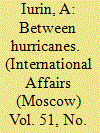

|
|
|
| 5 |
ID:
108996
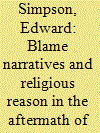

|
|
|
|
|
| Publication |
2011.
|
| Summary/Abstract |
Recent writing on religion in Gujarat has often confused political rhetoric with common religious belief and practice. Thus, religious categories have become caricatures standing for sociological realities and totalised worldviews. In this scheme, 'Hindus' and 'Muslims' are supposed to believe different things which ensure that they see and act in the world quite differently. In this paper, I examine the narratives of blame that emerged after the 2001 earthquake in Gujarat. The ethnography suggests that although religious identity plays a role in the way blame is cast, people of different religious communities also use common frames of logic and their shared experiences of shock and alienation to explain catastrophe. The religious reasoning of blame narratives is therefore shown to have a broader cultural existence outside the boundaries of particular religious identities.
|
|
|
|
|
|
|
|
|
|
|
|
|
|
|
|
| 6 |
ID:
101771
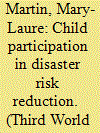

|
|
|
|
|
| Publication |
2010.
|
| Summary/Abstract |
Children are particularly vulnerable to the effects of natural disasters. This article aims to gain a deeper understanding of the specific effects of natural disasters on children and how they could better be involved in the disaster risk reduction (DRR) process. The article begins with a review of the literature published on the Child-led Disaster Risk Reduction (CLDRR) approach and describes the key issues. Then it identifies the effects of floods on children in Bangladesh and analyses the traditional coping mechanisms developed by communities, highlighting where they could be improved. Finally, it analyses how DRR stakeholders involve children in the DRR process and identifies the opportunities and gaps for the mainstreaming of a CLDRR approach in Bangladesh. This should contribute to a better understanding of how key DRR stakeholders can protect children during natural disasters. Encouraging the building of long-term, child-sensitive DRR strategies is an essential part of this process.
|
|
|
|
|
|
|
|
|
|
|
|
|
|
|
|
| 7 |
ID:
072680
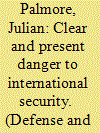

|
|
|
| 8 |
ID:
191598


|
|
|
|
|
| Summary/Abstract |
Do natural disasters affect presidential approval ratings? In this study, we argue that in South Korea this relationship is conditional on regional partisan cleavages. Since partisanship induces perceptual biases among distinct social groups, we expect that (1) the president’s co-partisans will not blame their president even if the government fails to prevent or mitigate damage from natural disasters, and (2) human and economic losses from disasters, or delivery of disaster relief aid, may boost approval ratings in partisan strongholds. We test these hypotheses using South Korea’s Park Geun-hye and Moon Jae-in administrations. The results of vector auto-regressions show that regional partisanship toward the incumbent significantly influences job approval ratings in the wake of natural disasters. While public opinion in metropolitan areas was not affected by disaster losses, both presidents’ approval rose after disasters—typhoons and windstorms, in particular—struck their strongholds in the southeastern part of the country.
|
|
|
|
|
|
|
|
|
|
|
|
|
|
|
|
| 9 |
ID:
132490
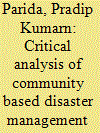

|
|
|
|
|
| Publication |
2014.
|
| Summary/Abstract |
Disaster may be de?ned as those extreme events either natural or man-induced, which exceed the tolerable magnitude within or beyond certain time limits, make adjustment dif?cult, result in catastrophic losses of property, income and lives and livelihood of people in general. Natural hazards involve comparatively high density processes and extreme events caused by both terrestrial and atmospheric processes. Where the impact of hazard is such that normal community and organizational arrangements are no longer functioning, disaster can be said to have occurred. Natural disasters take a huge toll of human lives and property and severely hamper development. It may not be possible to prevent natural disasters totally, but with careful pre-disaster planning and preparedness, we can reduce the adverse effect of the hazards and the economic loss. Here is required the signi?cance of disaster management.
|
|
|
|
|
|
|
|
|
|
|
|
|
|
|
|
| 10 |
ID:
139192
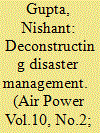

|
|
|
|
|
| Summary/Abstract |
Jammu and Kashmir (J&K) was once again in the news for devastation and intense trauma associated with hundreds of unnatural deaths. This time, the cause was not the commonly known beast of terrorism and / or cross border attacks, rather the damage was caused by nature’s fury in the form of unprecedented floods and inundation. The scale of intensity of extreme weather incidences like the J&K flood repeatedly being out the inadequacies in the country’s disaster response capabilities
|
|
|
|
|
|
|
|
|
|
|
|
|
|
|
|
| 11 |
ID:
109875
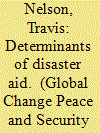

|
|
|
|
|
| Publication |
2012.
|
| Summary/Abstract |
This article examines the motivations behind the provision of disaster aid. Is this aid provision driven more by 'humanitarian' variables such as the severity of the political or natural emergency in the recipient state or 'political' variables such as the economic or strategic interest of the donor state? Through a statistical analysis of the aid activity of 22 donor states between 1997 and 2008, it is found that, contrary to much of the literature on humanitarian aid in general, humanitarian variables are consistently significant predictors of disaster aid provision. However, certain political variables are also significant, in that donor states provide more disaster aid to trading partners, former colonies, and military allies.
|
|
|
|
|
|
|
|
|
|
|
|
|
|
|
|
| 12 |
ID:
132497
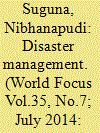

|
|
|
|
|
| Publication |
2014.
|
| Summary/Abstract |
Hundreds of Natural disasters take place worldwide every year causing irreparable damage to life and property. Earthquakes, ?oods, typhoons, hurricanes,- Tsunamis are among the worst of these natural disasters. Over the last few decades, there has been an alarming increase in the occurrence of natural disasters and the magnitude of their social, economic and environmental impact. During any natural disaster it is usually the" children who suffer the most. The nation witnessed the death of nearly a thousand children during the 2001 Bhuj earthquake. Out of them, 300 died while marching for the Republic day parade. They were in a narrow lane when the earthquake hit causing buildings onboth sides to collapse. It is said thatpnearly 1,884 school buildings collapsed leading to a loss of 5,950 class rooms. About 12000 schools suffered damages making them un?t for children to continue their studies. Fire tragedies, like the one in Kurnbakonam killed 93 children in a school. Another ?re accident in Dabwali, Haryana where a ?re broke out during a schoolfunction took he lives of many school children. Children in schools are the 'most vulnerable group during any disaster. These tragedies reiterate the need for all of us to sit up and think about the safety of these children. It is necessary to make schools safe and hazard proof. For this purpose, it is important to have disaster management, emergency preparedness and response plans at school level.
|
|
|
|
|
|
|
|
|
|
|
|
|
|
|
|
| 13 |
ID:
102739
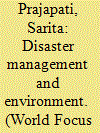

|
|
|
| 14 |
ID:
132498
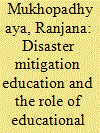

|
|
|
|
|
| Publication |
2014.
|
| Summary/Abstract |
Disasters are increasing exponentially. The number of disaster events which was 73 in 1900-09 has increased to 4494 during 2000-09. More people were affected in the two recent decades than the earlier ones. During the second half of the 20th century, more than 200 major natural disasters occurred in different parts of the world and claimed the lives of around 1.4 million people. In 2011 alone, 302 hazards resulted in disasters that claimed almost 30,000 lives, affected 206 million people and in?icted damages worth an estimated USS 366 billion, according to the United Nations Office for Disaster Risk Reduction.
|
|
|
|
|
|
|
|
|
|
|
|
|
|
|
|
| 15 |
ID:
107916
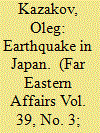

|
|
|
| 16 |
ID:
102715
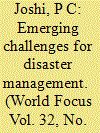

|
|
|
| 17 |
ID:
109503
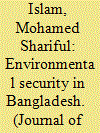

|
|
|
| 18 |
ID:
170847
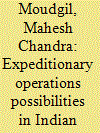

|
|
|
| 19 |
ID:
174858
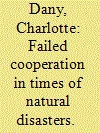

|
|
|
|
|
| Summary/Abstract |
This article asks why economically strong democracies reject humanitarian aid after severe natural disasters, focusing on the Kobe earthquake in Japan (1995), India’s response to the Indian Ocean tsunami (2004), and Hurricane Katrina in the United States (2005). It explains these rejections of humanitarian aid by analyzing the decision-makers’ ‘self-perceptions’ through the factors of manageability, national role perceptions, and domestic political impact, as well as ’other-perceptions’ through their relations to donors and the nature of the aid offers. It finds that even in those disaster-prepared and economically strong democracies, state leaders rejected humanitarian aid not simply because they had sufficient disaster management capabilities. Rather, bureaucratic hurdles and administrative failure impeded aid acceptance. Moreover, conceptions of those countries’ roles as established or emerging donors, as well as domestic political factors influenced their decisions. Ultimately, the dominant explanations focusing on wealth and capabilities are thus too shortsighted. Not only giving but also rejecting humanitarian aid follows political considerations.
|
|
|
|
|
|
|
|
|
|
|
|
|
|
|
|
| 20 |
ID:
190942
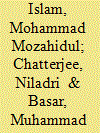

|
|
|
|
|
| Summary/Abstract |
The article explores the impact of one of the deadliest disasters in the twentieth century, the East Pakistan cyclone of 1970, also known as the Great Bhola Cyclone, on the first-ever general election held in united Pakistan immediately thereafter. It argues that the cumulative dissidence of the eastern bloc since the partition of India in 1947 had reached its crescendo and made a landfall impact following the disastrous aftermath of the cyclone, which was evidenced in the general election of December 1970, creating the very triggering effect that led to a series of political events and the bloodbath that followed, eventually culminating in the formation of an independent nation-state of Bangladesh in 1971. While doing so, the article builds on the literature on disaster and electoral politics, historical disasters, and uses hitherto underexplored sources, both official and unofficial, archives, and personal memoirs.
|
|
|
|
|
|
|
|
|
|
|
|
|
|
|
|
|
|
|
|
|